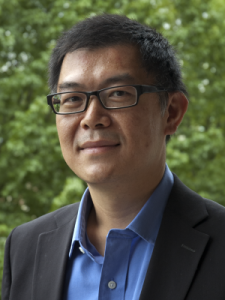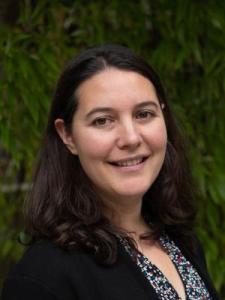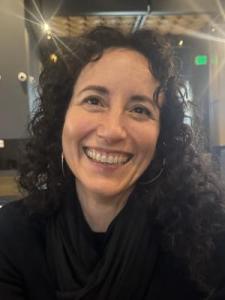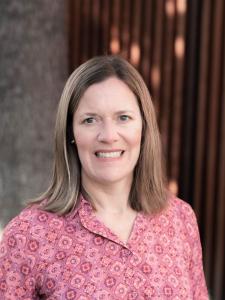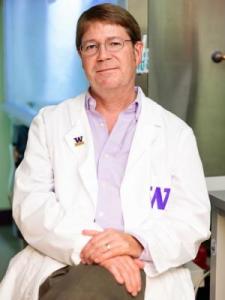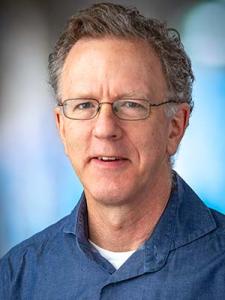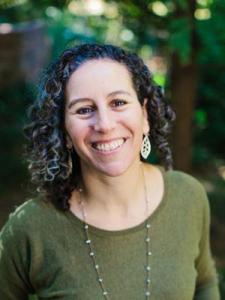University of Washington's Center for Exposures, Diseases, Genomics & Environment (EDGE) has an administrative infrastructure and technical support to foster multidisciplinary collaborations between researchers. The Center provides members with valuable technical support through its four facility cores and a pilot projects program. Descriptions of these cores and the services they provide can be found on the Core Services page. The Center's members are organized into five Collaborative Research Teams (CRTs). Members are assigned to the CRT that most closely represents their primary area of research interest, although many have interests that cut across the various areas. The EDGE Center is transitioning to a new organizational structure, including new Collaborative Translational Research Teams, with transition anticipated to be completed (dependent on funding) by March 2026.
Dr. Joel Kaufman serves as the Principal Investigator and Director of the Center. The EDGE Center is supported by the National Institute of Environmental Health Sciences and is part of the Institute’s Environmental Health Sciences Core Center program, Grant #P30ES007033.
Joel Kaufman
EDGE Director
As director,
Joel oversees the day-to-day operations of the Administrative Core, administers the Pilot Projects Program, and chairs the Internal Steering Committee of the Center. He works very closely with the Deputy Director and with other members of the EDGE Center leadership to guide and inspire members of the Center in their translational science research.
Edmund Seto
Deputy Director, Exposure Assessment, Biomarkers and Environmental Sensing Facility Core (EABES) Co-director
Edmund works with the director to provide guidance in the direction of the EDGE Center. As Co-Director of the Exposures Assessment, Biomarkers and Environmental Sensing Facility Core, Edmund is well connected with investigators and provides guidance to Facility Core Directors. He provides expertise in distributed environmental sensing.
Elena Austin
Exposure Assessment, Biomarkers and Environmental Sensing Facility Core (EABES) Co-director
Elena has primary responsibility for mobile monitoring, management of exposure network data and databases, and visualization of exposure data. She provides expertise in low-cost sensor deployment, mobile monitoring methods and management and validation of complex exposure assessment data sets.
Theo Bammler
Genomics, Bioinformatics & Biostatistics, Microphysiological Systems Facility Core (GBBM) Manager
Theo manages and oversees the daily activities of the three components that comprise the GBBM-Core: the Genomics, the Bioinformatics & Biostatistics, and the Microphysiological Systems Components. By overseeing the activities of all three components, Theo ensures seamless integration of the services provided by each.
Jamie Donatuto
Community Engagement Core (CEC) Co-director
As CEC co-director,
Jamie will work with the director to coordinate community engagement activities. She brings deep expertise related to engaging directly with rural and tribal communities. Prior to joining the EDGE team, Jamie served as a CEC Community Advisory Board member while working in community.
Nicole Errett
Community Engagement Core (CEC) Director, Integrative Environmental Health Sciences Facility Core (IEHSFC) Co-director
Nicole directs the CEC, providing EDGE researchers with guidance, resources, and training to design and implement reciprocal and rigorous community engaged research projects with community partners. Under her leadership, the CEC launched the Community Engaged Research Hub and developed innovative tools, trainings, and products, many of which have been utilized across Environmental Health Sciences Core Center network. Nicole also leads the IEHSFC's disaster research response studies area.
Elaine Faustman
Career Development Director, Developmental and Reproductive Disorders Collaborative Research Team (CRT) Lead
Elaine fosters the career development of future research leaders in environmental health sciences. She has been a Center member since its inception in 1995 and has collaborated successfully with many Center members in multi-disciplinary research projects. She has been instrumental in fostering the careers of several UW junior faculty members from diverse disciplines, encouraging them to incorporate translational environmental health science into their research.
Nancy Judd
Scientist Administrator
Alongside the director, Nancy is responsible for direct financial oversight of the Center and serves as the primary contact for communication with NIEHS. She directs all administrative activities such as preparation and submission of grant renewal documents and annual reports, planning Center events, and coordinating all aspects of Center communication. Nancy is instrumental in managing the daily functions of the Center, maintaining open lines of communication between members, and energizing the Center’s strategic planning process.
Catherine Karr
Integrative Environmental Health Sciences Facility Core (IEHSFC) Director
Catherine oversees all core activities and Steering Committee meetings that review core use and activities. She utilizes her network and expertise as an academic pediatric environmental health researcher and clinician and Director of the NW Pediatric Environmental Health Specialty Unit to assist with publicizing the core’s resources among the university’s clinical and translational research community. Catherine identifies opportunities that serve to translate the Center’s activities to communities in the Pacific Northwest and the broader clinical and public health professional community and policy makers.
Ed Kelly
Genomics, Bioinformatics & Biostatistics, Microphysiological Systems Facility Core (GBBM) Co-director, Hepatic, Renal and GI Diseases Collaborative Research Team (CRT) Lead
Ed serves as the primary contact for investigators who want to a) employ existing microphysiological systems (MPS) organ devices for investigating toxicants, b) develop MPS organ platforms beyond the existing core of liver, kidney or intestine or c) integrate multi-organ and/or integrated cell types (e.g. vascularization) for a given organ.
Chris Kemp
Environment and Cancer Collaborative Research Team (CRT) Lead
Chris has a 30+ year research career in studying the environmental and genetic basis of cancer. As lead of the Environment and Cancer CRT, he will help facilitate opportunities for collaboration between members and facilitate Center integration.
Karen Levy
Genomics, Bioinformatics & Biostatistics, Microphysiological Systems Facility Core (GBBM) Director
As director,
Karen is responsible for evaluating the overall use of GBBM. She has expertise in environmental microbiology and the microbiome. Her research group uses microbiology, genomics, and epidemiology to study linkages between the environment and enteric (food and waterborne) disease transmission, with a focus on water quality, food safety, animal exposure, and extreme weather.
Sheela Sathyanarayana
Pilot Projects Director
As Pilot Projects director,
Sheela works with the EDGE director and deputy director to shape and facilitate the success of the Center's pilot grants. She conducts research focused on endocrine disrupting chemicals in plastics, including phthalates and bisphenol A in pregnancy and childhood health outcomes.
Chris Simpson
Exposure Assessment, Biomarkers and Environmental Sensing Facility Core (EABES) Director
Chris has primary responsibility for analytical chemistry and development of biomarker quantitative biomarker assays. He is trained as an environmental and analytical chemist, and his research interests involve the application of analytical chemistry to the development of techniques for assessment of exposure to toxic chemicals, and the subsequent application of those techniques to investigate occupational and environmental exposures.
Zhengui Xia
Neurodegenerative Diseases Collaborative Research Team (CRT) Lead
Zhengui serves as the leader of the Neurodegenerative Diseases CRT, which aligns with her areas of research interests in the study of mechanisms underlying the neurotoxicity and developmental neurotoxicity of chemicals and the study of gene-environment interactions in neurotoxicity.

